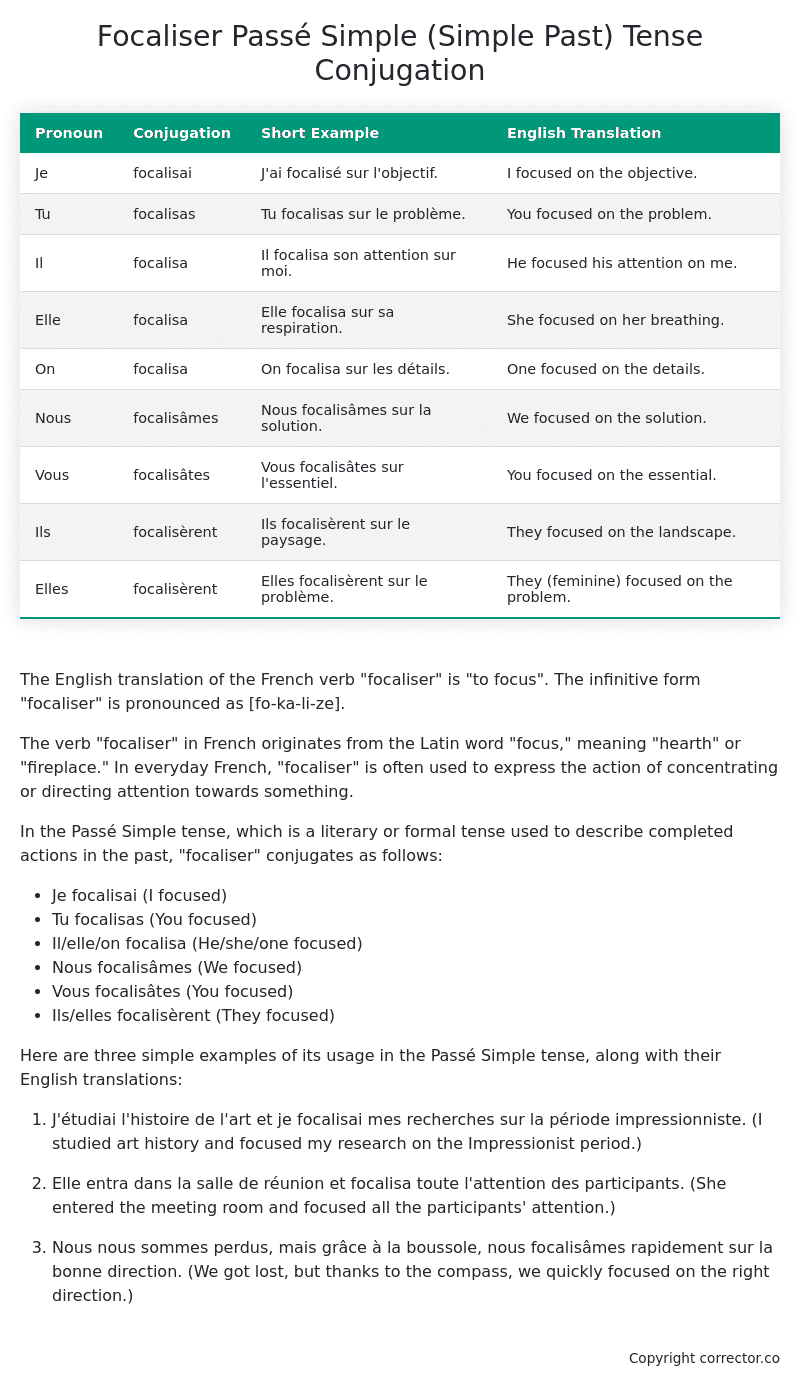Passé Simple (Simple Past) Tense Conjugation of the French Verb focaliser
Introduction to the verb focaliser
The English translation of the French verb “focaliser” is “to focus”. The infinitive form “focaliser” is pronounced as [fo-ka-li-ze].
The verb “focaliser” in French originates from the Latin word “focus,” meaning “hearth” or “fireplace.” In everyday French, “focaliser” is often used to express the action of concentrating or directing attention towards something.
In the Passé Simple tense, which is a literary or formal tense used to describe completed actions in the past, “focaliser” conjugates as follows:
- Je focalisai (I focused)
- Tu focalisas (You focused)
- Il/elle/on focalisa (He/she/one focused)
- Nous focalisâmes (We focused)
- Vous focalisâtes (You focused)
- Ils/elles focalisèrent (They focused)
Here are three simple examples of its usage in the Passé Simple tense, along with their English translations:
-
J’étudiai l’histoire de l’art et je focalisai mes recherches sur la période impressionniste.
(I studied art history and focused my research on the Impressionist period.) -
Elle entra dans la salle de réunion et focalisa toute l’attention des participants.
(She entered the meeting room and focused all the participants’ attention.) -
Nous nous sommes perdus, mais grâce à la boussole, nous focalisâmes rapidement sur la bonne direction.
(We got lost, but thanks to the compass, we quickly focused on the right direction.)
Table of the Passé Simple (Simple Past) Tense Conjugation of focaliser
| Pronoun | Conjugation | Short Example | English Translation |
|---|---|---|---|
| Je | focalisai | J’ai focalisé sur l’objectif. | I focused on the objective. |
| Tu | focalisas | Tu focalisas sur le problème. | You focused on the problem. |
| Il | focalisa | Il focalisa son attention sur moi. | He focused his attention on me. |
| Elle | focalisa | Elle focalisa sur sa respiration. | She focused on her breathing. |
| On | focalisa | On focalisa sur les détails. | One focused on the details. |
| Nous | focalisâmes | Nous focalisâmes sur la solution. | We focused on the solution. |
| Vous | focalisâtes | Vous focalisâtes sur l’essentiel. | You focused on the essential. |
| Ils | focalisèrent | Ils focalisèrent sur le paysage. | They focused on the landscape. |
| Elles | focalisèrent | Elles focalisèrent sur le problème. | They (feminine) focused on the problem. |
Other Conjugations for Focaliser.
Le Present (Present Tense) Conjugation of the French Verb focaliser
Imparfait (Imperfect) Tense Conjugation of the French Verb focaliser
Passé Simple (Simple Past) Tense Conjugation of the French Verb focaliser (You’re reading it right now!)
Passé Composé (Present Perfect) Tense Conjugation of the French Verb focaliser
Futur Simple (Simple Future) Tense Conjugation of the French Verb focaliser
Futur Proche (Near Future) Tense Conjugation of the French Verb focaliser
Plus-que-parfait (Pluperfect) Tense Conjugation of the French Verb focaliser
Passé Antérieur (Past Anterior) Tense Conjugation of the French Verb focaliser
Futur Antérieur (Future Anterior) Tense Conjugation of the French Verb focaliser
Subjonctif Présent (Subjunctive Present) Tense Conjugation of the French Verb focaliser
Subjonctif Passé (Subjunctive Past) Tense Conjugation of the French Verb focaliser
Subjonctif Imparfait (Subjunctive Imperfect) Tense Conjugation of the French Verb focaliser
Subjonctif Plus-que-parfait (Subjunctive Pluperfect) Tense Conjugation of the French Verb focaliser
Conditionnel Présent (Conditional Present) Tense Conjugation of the French Verb focaliser
Conditionnel Passé (Conditional Past) Tense Conjugation of the French Verb focaliser
Conditionnel Passé II (Conditional Past II) Tense Conjugation of the French Verb focaliser
L’impératif Présent (Imperative Present) Tense Conjugation of the French Verb focaliser
L’impératif Passé (Imperative Past) Tense Conjugation of the French Verb focaliser
L’infinitif Présent (Infinitive Present) Tense Conjugation of the French Verb focaliser
L’infinitif Passé (Infinitive Past) Tense Conjugation of the French Verb focaliser
Le Participe Présent (Present Participle) Tense Conjugation of the French Verb focaliser
Le Participe Passé (Past Participle) Tense Conjugation of the French Verb focaliser
Struggling with French verbs or the language in general? Why not use our free French Grammar Checker – no registration required!
Get a FREE Download Study Sheet of this Conjugation 🔥
Simply right click the image below, click “save image” and get your free reference for the focaliser Passé Simple tense conjugation!

Focaliser – About the French Passé Simple (Simple Past) Tense
Formation
Usage
Narration
Historical Context
Interactions with other tenses
Passé Composé
Imparfait
Conditional and Subjunctive
Summary
I hope you enjoyed this article on the verb focaliser. Still in a learning mood? Check out another TOTALLY random French verb conjugation!


